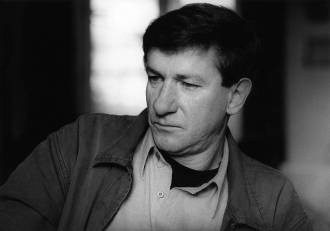
A poet and prose writer, his work often rekindles memories of the past and portrays in in an affectionate light.
Aleksander Jurewicz, poet and prose writer, was born in 1952 in Lida in Belarus. In 1957, following an expatriation campaign conducted by the authorities, he and his parents left Belarus to make their home in Gdańsk. Jurewicz studied at the University of Gdańsk and the Screenplay Writing Department of the Łódź Film School.
In the 1970s and 1980s he published several volumes of verse which reveal a strong autobiographical bent. Jurewicz first won fame with the publication of Lida (1990), a work which earned him the Czesław Miłosz Prize. Lida consists of a series of poetic fragments, prose sketches and extracts from the author’s own letters to his grandmother. A mournful lamentation for the lost paradise of innocence, Lida offers the reader a series of literary snapshots from the small town where the author spent his early childhood and chronicles his removal to an alien and unfriendly world. The past is recreated not only by means of a literary portrait of great beauty, but also through a language strongly rooted in the dialect of Poland’s eastern borderland and richly laced with Belarussian influences. Through the poetic rhythm of his prose in Lida, Jurewicz rekindles our affection for the past, compelling us to contemplate the mystery of biography, and thus the mystery of man’s fate.
In his story, Pan Bóg nie słyszy głuchych (The Lord doesn’t Hear the Deaf), Jurewicz describes his years in Łódź. The course of the narrative is interspersed with moments of introspection and scenes that take place on the border-line between sleep and consciousness – for the author spins out an imaginary tale of a childhood romance in far-off Belarus. This book of small dimensions is exquisitely ensconced in the real world of the 1960s. At the same time it represents a successful attempt by the author to revisit the world of his childhood and is a moving tribute to the memory of his forefathers.
“I don’t know how to explain everything, but I knew that if I hadn’t been able extract this migrant’s tale from my head, my life would not have been fully complete. There would be some shadow hanging over it, some unfinished business.” (A. Jurewicz)
Selected Bibliography:
- Lida. Bialystock: Versus, 1990.
- Dopóki jeszcze i inne wiersze (“As Long As” and other Poems). Gdańsk: Gord, 1991.
- Pan Bóg nie słyszy głuchych (The Lord Doesn’t Hear the Deaf). Gdańsk: Marabut, 1995.
- Życie i liryka (Life and Lyrics). Gdańsk: słowo/obraz terytoria, 1998.
- Prawdziwa ballada o miłości (A True Ballad About Love). Krakow: Znak 2002.
Translations:
- German:Lida fragments in: Deutsch-Polnische Ansichten DPI, 6/1994, (Almanach). Wiesbaden: Harassowitz Verlag.Nach den Gewittern, Ein polnisch-deutsches Lesebuch, (Antology). Göttingen: Steidl, 1995.Zwischen den Linien, (Antology). Hannover: Postskriptum, 1996.
Comments
Proprius 13.02.2019, 16:47
Aleksander Jurewicz’s prose is “over-season”, distant from literary fashions and trends, woven from personal experiences and experiences, and yet universal, because it bears a poignant testimony to what is so intimate in human lives that it is usually hidden …
This is a kind of “loss literature” – because also life, which we do not like to remember, is a strand of losses. Losses that are impossible to prevent, and from the meaning of what you have left irretrievably we realize only when what is most precious. Aleksander Jurewicz proves that such confrontations with memory can be more than a vast assignment of shadows that the losses can be generously divided, giving them other types of communities with them.
Among living Polish writers, nobody unless (except Wiesław Hunter) can not suffer like that the essence of passing, without one false tone. It’s a literature that reads greedy, on one breath and returns to it after a multi-life …
brandy 11/02/2019, 20:37
A modest Mr. Aleksander, and his pen is excellent. Reading “LIda” I cried from the first to the last page, and “Ballad about Love” is the most beautiful chronicle of this feeling